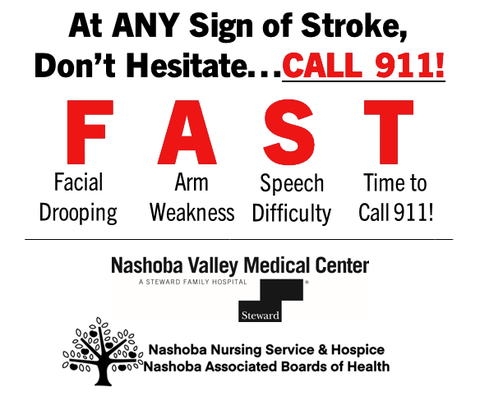Respond to Stroke Symptoms FAST: NVMC Partners with Nashoba Associated Boards of Health for Stroke Awareness

May is Stroke Awareness Month. Nashoba Valley Medical Center has partnered with Nashoba Associated Boards of Health with support from a MORE Advertising grant to raise awareness of stroke symptoms and educate the community on the importance of calling 911 immediately when stroke symptoms present.
About Stroke
A stroke is a medical condition in which poor blood flow to the brain results in cell death.
There are two main types of stroke that cause parts of the brain to stop functioning properly:
- Ischemic stroke, which occurs due to lack of blood flow, and
- Hemorrhagic stroke, which occurs due to bleeding.
A stroke happens in the US every 40 seconds and a fatal stroke happens every four minutes.
Unfortunately, many stroke victims do not get to the hospital in time for successful treatment. This is why it is so important to recognize the signs of stroke right away and call 9-1-1. Yet 1 in 3 stroke patients never call 9-1-1.
Call 911 Right Away When Stroke Symptoms Arise
Calling 9-1-1 at the first symptom of stroke can help you get to the hospital in time for life-saving care. If you get to the hospital within 3 hours of the first symptoms of an ischemic stroke, you may get a type of medicine called a thrombolytic (a “clot-busting” drug) to break up blood clots. Tissue plasminogen activator (tPA) is an example of a thrombolytic.
In the past three years in NVMC’s emergency department, only 46% of patients with stroke symptoms arrived within the three-hour timeframe. When patients arrive within this critical window at the NVMC ED, patients receive tPA faster than the Massachusetts state median for administration time.
Stroke Prevention Tips
- Eat a healthy diet low in sodium with plenty of fruits and vegetables. Tips on nutrition are available at CDC’s Division of Nutrition, Physical Activity, and Obesity website.
- Maintain a healthy weight. CDC’s Healthy Weight website includes information and tools to help you lose weight.
- Be physically active. Visit CDC’s Physical Activity website for more information on being active.
- Don’t smoke and avoid secondhand smoke. CDC’s Office on Smoking and Health website has information on quitting smoking.
- Limit alcohol use. See CDC’s Alcohol and Public Health website for more information.
- Prevent or manage your other health conditions, especially high blood pressure, high cholesterol, diabetes, and obesity. Visit CDC’s High Blood Pressure, Cholesterol, and Diabetes webpages on these conditions to learn more.
Stroke Awareness Video Series
Nashoba Valley Medical Center and Nashoba Associated Boards of Health (NABH) have partnered to create this series of quick videos to help you you improve your chances for a full recovery when stroke symptoms arise.
Tamara Bedard, RN, of NABH, introduces this video series.
Learn how to recognize stroke symptoms and why it’s so important to call 9-1-1 immediately when symptoms arise, from Dr. Erik Deede, Associate Chief of Emergency Medicine at Nashoba Valley Medical Center.
Harvard, MA, EMS professional John Cogan talks about how a quick response from EMTs can save a life when stroke symptoms arise. Remember: always call 9-1-1 FAST if you suspect a stroke.
Hear from a local stroke survivor about how an immediate call to 9-1-1 may have saved his life—and how his experience led him to a career as an EMT to help save others.
More Helpful Resources
American Heart Association Heart Attack and Stroke Symptoms site
CDC Stroke: Includes the Videos Learn about stroke and it’s causes, Know your risk for stroke, Treat and Recover from Stroke, Resources for Health Professionals
Recognizing the Signs and Symptoms of Stroke: A video from the CDC
About NABH
Nashoba Associated Boards of Health (NABH) is a regional public health agency serving sixteen towns in North Central Massachusetts. NABH's goal is to promote healthy people, healthy families, and a healthy environment through compassionate care, education, and prevention. Stroke education and screening are an important part of its community outreach, as heart disease and stroke are leading causes of death. Additionally, NABH focuses on restorative and rehabilitative care at home, and supports survivors of stroke and their caregivers as they heal. Residents are invited to attend monthly health and blood pressure screening clinics throughout the region to help them identify their risk profile for stroke and cardiovascular disease. For a schedule of clinics, visit the NABH Calendar.
